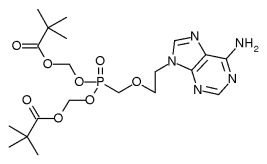Lamivudine was previously the only oral medication for chronic hepatitis B infection and had problems with rapid induction of viral resistance, which led to severe hepatitis flares in some affected patients. Tailoring therapy to those patients at increased risk of disease progression has been important, given the known risks of treatment. The presence or absence of hepatitis B envelope antigen (HBeAg) provides some important prognostic information. Those patients who are initially HBeAg-positive but then seroconvert to a negative antigen status with positive envelope antibody and suppressed viral load are known to have decreased progression of liver disease. In contrast, infected patients who have ongoing viral replication in the presence of negative HBeAg and positive envelope antibody appear to have more risk for severe and progressive liver injury. Marcellin and colleagues from Adefovir Study Group 437 (use of adefovir in HBeAg-positive patients) and Hadziyannis and colleagues from Adefovir Study Group 438 (HBeAg-negative patients) report on their international multicenter trials of adefovir for chronic hepatitis B infection.
Group 437 enrolled 515 adults and randomly assigned them to receive 10 mg of adefovir once daily, 30 mg of adefovir once daily, or placebo once daily for a 48-week course. Group 438 followed 185 patients who were randomized to receive 10 mg of adefovir once daily or placebo once daily, also for a 48-week course. Those patients with biochemical evidence of cirrhosis (e.g., elevated bilirubin or prothrombin time, decreased serum albumin), hepatocellular carcinoma, or other serious medical or psychiatric illnesses were excluded from enrollment.
In the HBeAg-positive patients, after 48 weeks of treatment, histologic improvement on liver biopsy was seen in 53 percent of those taking 10 mg of adefovir daily, 59 percent of those taking 30 mg of adefovir daily, and 25 percent of those taking placebo. Undetectable viral load was seen in 21 percent of those taking 10 mg of adefovir, 39 percent of those taking 30 mg of adefovir, and none of those taking placebo. Serum transaminase levels normalized in 48 percent on the 10 mg of adefovir dose, 55 percent on the 30 mg of adefovir dose, and 16 percent on placebo.
For the HBeAg-negative study, there were also statistically significant differences between adefovir treatment and placebo for liver biopsy histologic improvement (64 percent versus 33 percent), undetectable viral load (51 percent versus zero) and normalized transaminase levels (72 percent versus 29 percent).
No adefovir resistance gene mutations were identified in the viruses of those patients receiving treatment in either study group. The lower dose of adefovir (10 mg daily) used in the HBeAg-negative patients did not have any adverse effects that were different from placebo. The group receiving the higher dose of adefovir (30 mg daily) in the HBeAg-positive study did demonstrate some renal toxicity. An increase in serum creatinine of more than 0.5 mg per dL (44 [micro]mol per L) occurred in 8 percent of patients, but all normalized with a dose reduction or interruption of adefovir treatment.
The authors conclude that therapy with 10 mg of adefovir daily is safe and well tolerated. In both HBeAg-positive and HBeAg-negative patients, this dosage is associated with improvements in liver biopsy and serum markers of chronic hepatitis B infection.
EDITOR'S NOTE: Antiviral therapies for chronic hepatitis B, especially interferon-alfa, have been troubled by limited efficacy, considerable expense, and many adverse effects, which have decreased their acceptability to patients. These studies of adefovir show improvement only in surrogate markers (e.g., suppressed viral load, decreased serum transaminases, no appearance of viral resistance) rather than clinical outcomes, but at least these favorable data are coming from an oral medication with a side effect profile similar to placebo.
Marcellin P, et al. Adefovir dipivoxil for the treatment of hepatitis B e antigen-positive chronic hepatitis B. N Engl J Med February 27, 2003;348:808-16, and Hadziyannis SJ, et al. Adefovir dipivoxil for the treatment of hepatitis B e antigen-negative chronic hepatitis B. N Engl J Med February 27, 2003;348:800-7.
COPYRIGHT 2003 American Academy of Family Physicians
COPYRIGHT 2003 Gale Group



